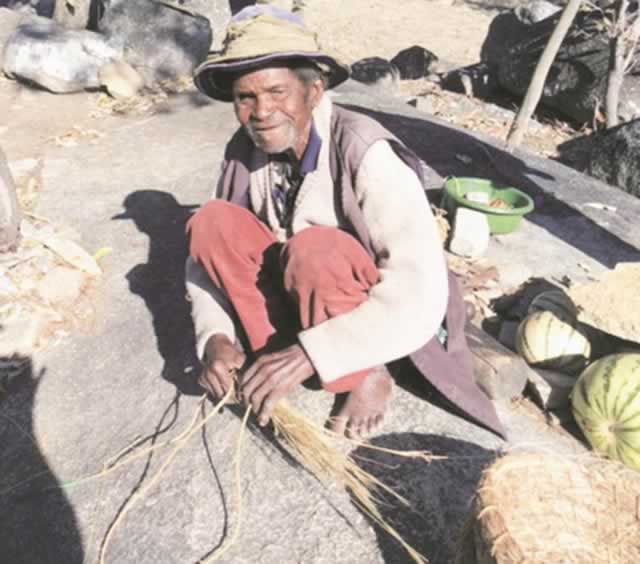Celebrating the power of memory


For centurion Muza Chabhenda Zingana Muchedzi Chidzambwa, the memories that he values most, do not fade
Sekai Nzenza on Wednesday
“How do you know what you are doing when you are blind?” I asked him. “I use my memory to see,” he said.
LIGHTNING struck when Babamukuru Muza was herding cattle in the valley along the Save River. It hit the cow first, killing her instantly. Then it attempted to kill Babamukuru Muza. It struck him on the head and damaged his right eye. But he survived. He still recalls the event and how he woke up to see many people.
He heard his uncle saying the lightning bolt had been sent to kill him by a witch. But the ancestors had said no, it was too early to take Muza away from the land of the living. The boy was still in his youth. He was strong, handsome, and full of life and promise.
The year of the lightning was possibly 1930. Not many people recorded dates in those days. For most of his adult life, Muza Chabhenda Ziganga Muchedzi Chidzambwa had one eye. Then he lost the other one to cataracts a couple of years ago.
Babamukuru Muza is 100-years-old. He knows this because his uncle, Sekuru vake, brother to his mother, told him that he was born during the rainy season of 1914, the year the whole family arrived to settle in the mountains along the Save River, not too far from Hwedza, Romorehoto and Nyangarire mountains. His memory is very sharp, even on detail.
My brother Sydney and my cousin Munya visited Babamukuru Muza over the Heroes and Defence Forces holidays, this last weekend. His one hut is about 15 km by road from our village. But if you cut across the mountains, along the narrow paths, the distance is less than 15 km.
The terrain is not meant for a car. Our roads are bad and it is always risky to drive this far from “civilisation”. But shall we not visit our people because they live too far from technology? Like many villages around, Babamukuru Muza’s home has been passed by development. Life has been like this, with neither running water nor electricity for all of his 100 years.
Babamukuru Muza is a brother to Nhau, my aunt, Tete Emma’s husband.
According to tradition, Babamukuru Muza could have been my husband too because his brother was married to my aunt.
We sat on big rocks near Babamukuru Muza’ hut, on the spot where he spends all day making baskets, matendere. Relaxed in the warm sun, we talked about the past.
Babamukuru Muza said his one eye had stopped him from doing some jobs. When the Second World War started, the authorities said he had no chance of joining the African Rifles Series who went to fight Hitler’s war, hondo ya Hitira, as they remember it back here in the village.
And yet he was not exempt from paying the dog, cattle, and hut and bicycle taxes required by the Rhodesian government from every adult African man. Like his brother Nhau, Muza went to work on the white man’s farms around Hwedza.
Because Africans could not pronounce the English names of the farms, they made them sound like Shona names. Muza did various jobs as a farm labourer at Surivhani (Sullivan), Bristoro (Bristol), Rashingtoni (Lushington), Bhachi (Bath) and Vherevhenja (air Adventure). Then he left the farms and arrived in Enkeldoorn after Hitira’s War was over. He learnt how to use the pedal sewing machine. From then on, he became a tailor and he worked in Enkeldoorn (Chivhu), Marandellas (Marondera) Umvuma (Mvuma) and Fort Victoria (Masvingo).
Back in the village, they said he had forgotten to get married, because he was already over 40 and still a bachelor. “I came home once, when Garfield Todd was prime minister and my girl had gone,” he said, shaking his head sadly. “I wanted to marry only her,” he told me. My brother Sydney and Munya had left the rock where we were sitting. They were busy walking around and checking the brick making furnaces next door to Babamukuru Muza’s village hut.
I moved closer to him and asked, “Who was the girl you loved?”
“Your aunt, Sukutai. I loved Sukutai,” he said. Then his face lit up and he smiled, recalling the names of all my aunts, Sekuru Dickson’s daughters from his seven wives.
The first wife was my grandmother Mbuya VaMandirowesa whose first born daughter was my aunt Tete Emma who married Nhau, Muza’s brother.
With laughter in his sad blind eyes, he recalled the romantic days when he visited our village to do the work of brothers-in-law, basa revakuwasha. He laughed as he remembered how he had tried to chase after each one of them. He said Tete Verina was wild, authoritative and difficult.
Then there was Tete Matinetsa, very light-skinned and she could have been a good wife to others, but not to him. Tete Esther was too soft, too quiet and too slow. Tete Winnie was a lot younger, educated and too proud to be seen with village men.
She worked at the District Commissioner’s office, teaching African women good hygiene and how to bake cakes.
“Is Winnie still alive?” Babamukuru Muza asked. I said she was and she lives in Gutu where she had since become a member of the Apostolic faith after her husband’s death.
“Sukutai was the woman I wanted,” he said, recalling how he first spoke to her alone. One day, during a visit to our village, he met Sukutai when she was looking for firewood. He fell in love with her immediately. “It was her teeth, her dark smooth skin, her softness and her manner that was full of love,” Babamukuru Muza said.
I remembered Tete Sukutai, who was married to Mutsvenguri near Hande Mission in Dorowa. Her front teeth were shaped like a ‘V’. Whenever she visited my mother, they talked and laughed for ages. Three weeks ago, we were in her village burying her oldest son Vincent.
“Is Sukutai alive?” Babamukuru Muza asked.
“She died a few years ago,” I told him. He said, over the years, he had thought about her. In his mind, he somehow knew she was dead. But he just wanted to hear that from someone who is of her blood. Werudzi rwake.
“But I am still alive to replace Sukutai,” I told him, touching his strong rough hands gently.
“Ah, what can I do with you now? I am like an old clay pot that boils water slowly because it is about to break (Hari yofanzirofa).’’
“What does age got to do with anything, Babamukuru? I will come and build my hut next to yours. But first, I must ask permission from your wife.” I said, getting up and walking over to Babamukuru Muza’s wife, who sat a short distance away, perhaps listening or not listening. Or maybe she was just enjoying the conversation. She sat with her head down, her mouth open and slightly on the side. She had not said a word since we arrived.
After many years in Fort Victoria, Babamukuru Muza had come home alone. He was still a bachelor. The elders in the village said it was custom to help a bachelor to find a wife. A man must produce children. How can the clan grow unless a man does what is expected of him? His brothers offered him a young girl from a far away village near Daramombe Anglican Mission. She was in her late 20s and mentally challenged. They said she will make a good wife as long as she could cook and look after the house. It did not matter that she forgot many things. Babamukuru Muza did not argue.
He took the wife and they had five children. They say some of the children are also mentally-challenged. The children are all grown up now and have moved away from the village. Babamukuru Muza is left with his quiet wife. They live in the one hut. He sleeps on the left side of the cooking place and she sleeps on the right side. They have all their belongings piled up behind the hut’s door. They do not make their ‘bed’, because it is easier to lie down whenever you want to do so without making and unmaking the sleeping mat.
When Babamukuru Muza had barely settled back in the village, the liberation war started. Many people died, including Headmaster Mapeza at Mufudzi Wakanaka School. One night, Tete Emma, Babamukuru Nhau, their oldest son Munhu and the last born son Diamond were shot dead.
“Their bodies were thrown in the cave near those big rocks,” Babamukuru Muza said, pointing east. “We buried them many years after the war.” I nodded because I knew the story all too well. My mother, being the senior daughter-in-law, muroora mukuru, was responsible for arranging the bones of all four skeletons before burial. Only a muroora or one, who is not related to the deceased by blood, was allowed to touch the bones.
Earlier on during our visit to see Babamukuru Muza, my brother Sydney, Munya, another cousin and I had already spent some time paying our respects at the graves of my aunt Tete Emma and her family. The graves look lonely and forgotten, covered in thickets of lantana camara in the ruins of what used to be their village. Over the years, there have been many stories over who killed my aunt and her family and why. But we do not know the answer.
“It was the war. Those who killed them met their own bad luck,” said Babamukuru Muza, reaching for the long metal needle that he uses to make the grass nests and baskets.
I watched him weave the bark string through so artistically.
“How do you know what you are doing when you are blind?” I asked him.
“I use my memory to see,” he said.
Dr Sekai Nzenza is CEO of Rio Zim Foundation. She writes in her own personal capacity.








Comments